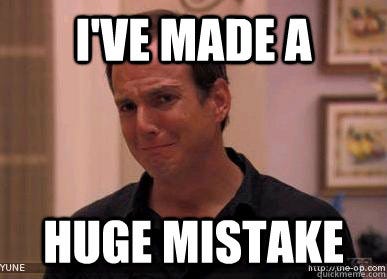Look for billion dollar mistakes
A method for coming up with startup ideas
Successful startups grow so quickly that incumbents can’t catch up. Google couldn’t catch Facebook. Facebook couldn’t catch Instagram. Instagram couldn’t catch Snapchat. From each of these incumbent’s perspectives, the competitive startup’s success is actually a $1B+ strategic mistake.
This incumbent perspective leads to a novel approach for finding startup ideas. Instead of generating ideas by trying to be creative or visionary, we can just focus on flaws in human reasoning and knowledge and ask which of those flaws are likely to lead to $1B+ strategic errors.
Here’s how this method would generate the idea for Vanguard, the investment platform that very profitably eschewed managed funds in favor of passive ones. First, we note that executives in wealth management work in an industry large enough to make a billion dollar mistake. Second, we remember that humans easily mistake luck for skill, especially when they are considering their success and the value of their work. Thinking Fast and Slow puts it this way:
The illusion of skill…is deeply ingrained in the culture of the [wealth management] industry. Facts that…threaten people’s livelihood and self-esteem—are simply not absorbed.1
Knowing about this bias, we can ask: Are fund managers overestimating the value they provide and therefore over-changing for their services? The answer on average is “yes,” and their margin became Vanguard’s opportunity.
Here’s another example of how this method would generate the idea for Spotify. The music industry is obviously huge enough for billion dollar errors, but it’s much less obvious that selling music in bundles isn’t merely an artifact of its prior physical distribution channel but rather a way to generate more surplus for buyers and sellers via price discrimination. Steve Jobs probably didn’t know this obscure detail of microeconomic theory, which is why Spotify wound up crushing iTunes.
If you’re looking for a startup idea, run this exercise with every combination of large industry and human cognitive bias / knowledge gap you can think of. When you come up with an idea, remember:
It’s unlikely someone is making an obvious billion dollar mistake. If you’re startup idea is obvious, it’s probably not a good one.
Big mistakes are less likely when there are many people trying to avoid them.2 Look for ideas in industries that have relatively few people trying to avoid billion dollar mistakes.
Daniel Kahneman, Thinking Fast and Slow, 216
This is why open source software is often more secure. It benefits from more eyeballs that can catch glaring security issues. This is why its so hard to beat the stock market.


